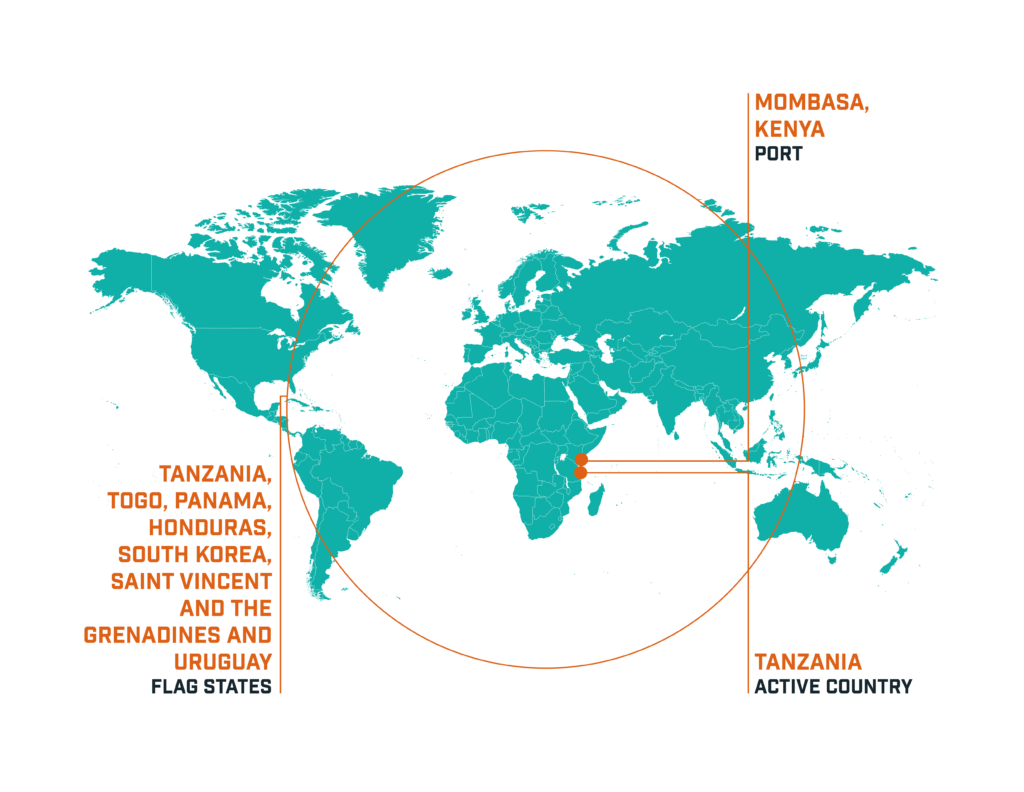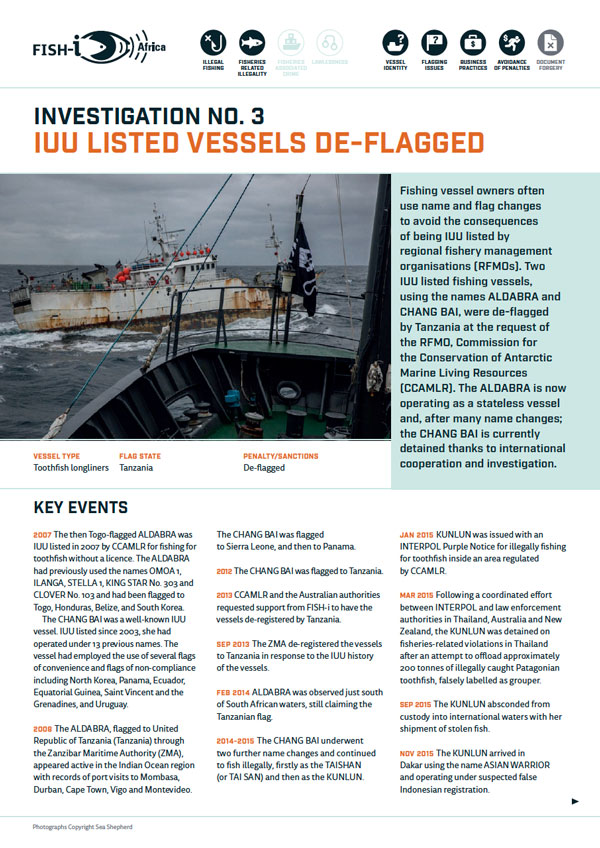INVESTIGATION No. 3 FISH-i Africa country de-flags IUU listed fishing vessels
Fishing vessel owners often use name and flag changes to avoid the consequences of being IUU listed by regional fishery management organisations (RFMOs). Two IUU listed fishing vessels, using the names ALDABRA and CHANG BAI, were de-flagged by Tanzania at the request of the RFMO, Commission for the Conservation of Antarctic Marine Living Resources (CCAMLR). The ALDABRA is now operating as a stateless vessel and, after many name changes; the CHANG BAI is currently detained thanks to international cooperation and investigation.
Key events
2007: The Togo flagged ALDABRA was IUU listed in 2007 by CCAMLR for fishing without a fishing license targeting toothfish. The Aldabra had used the previous names of OMOA 1, ILANGA, STELLA 1, KING STAR No. 303 and CLOVER No. 103 and had been flagged to Panama and Honduras.
The CHANG BAI was a well-known IUU vessel, blacklisted since 2003, she had operated under the previous names of HONGSHUI, HUANG HE 22, SIMA QIAN BARU 22, GALAXY, DORITA, BLACK MOON, INA MAKA and CORVUS and has also employed the use of several flags of convenience including South Korea, Panama, Saint Vincent and the Grenadines and Uruguay.
2008: The ALDABRA re-flagged to Tanzania and appears active in the Indian Ocean region with records of port visits to Mombasa, Durban and Cape Town as well as Vigo and Montevideo.
2013: CCAMLR and the Australian authorities requested support from FISH-i Africa to have the vessels de-registered by Tanzania.
September 2013: Zanzibar Maritime Authority de-registered the vessels in response to the IUU history of the vessels.
February 2014: ALDABRA is observed just south of the South African waters no longer flagged to Tanzania but still using the Tanzanian flag.
2014-2015: The CHANG BAI underwent two further name changes and continued to fish illegally, firstly as the TAISHAN and then as the KUNLUN.
January 2015: KUNLUN is issued with and INTERPOL Purple Notice for illegally fishing for toothfish inside an area regulated by the CCAMLR.
March 2015: Following a coordinated effort between INTERPOL and law enforcement authorities in Thailand, Australia and New Zealand the KUNLUN was detained on fisheries-related violations in Thailand after an attempt to offload approximately 200 tonnes of illegally caught Patagonian toothfish, falsely labelled as grouper.
September 2015: The KUNLUN absconds from custody into international waters with her shipment of stolen fish.
February 2016: Renamed as ASIAN WARRIOR and operating under false registration with fake Indonesian flag the vessel is detained in Senegal.
How?
The evidence uncovered during FISH-i investigations demonstrates different methods or approaches that illegal operators use to either commit or cover-up their illegality and to avoid prosecution.
Vessel identity issues: Both the ALDABRA and CHANG BAI used multiple identity changes to hide their history of IUU fishing across jurisdictions, enabling the vessels to register with new flag States and obtain authorisations to fish from Tanzania.
Flagging issues: Flag hopping helps conceal the real identity of IUU fishing vessels. The use of flags of convenience and noncompliance keeps checks and controls to a minimum and if caught operating illegally there is little follow up from flag States who may not have the will nor capacity to act.
Business practices: The company structures for both vessels were found to span over several continents, making identification of the beneficial owner difficult. There was suspicion that corruption may have limited the sharing of information between agencies in Tanzania, and the undetected absconding of the KUNLUN from Thai detention provides further
suspicion of corruption.
Avoidance of penalties: Not only did the KUNLUN abscond but by hiding the identity and history of the vessels the owner avoided the consequences of being IUU listed by an RFMO.
Document forgery (suspected): The registration documents provided to Tanzania are suspected to be forgeries.

What did FISH-i Africa do?
- Zanzibar Maritime Authority de-flagged in cooperation with the Tanzania Deep Sea Fisheries Authority (DSFA).
- Task Force wide coordinated response to refuse re-flagging requests.
- Task Force wide coordinated response to refuse fishing licence requests.
- Created awareness around the IUU fishing vessels on the Stop Illegal Fishing website.
- Liaised with CCAMLR and Australian authorities.
What worked?
- Cross checking of information by CCAMLR identified the IUU vessels operating in Tanzanian waters.
- De-flagging and refusing them fishing licences, forced the vessels out of the region and rendered them stateless and without the ability to fish legally anywhere in the world.
- Strong policy statements from political leaders, supporting cooperation and information sharing gave national officers confidence to act.
- INTERPOL engagement and the issuance of a public Purple Notice raised the profile of the vessels.
What needs to change?
- Flagging practices need to be improved to prevent flag hopping and make sure IUU listed vessels are denied access to a flag.
- Effective catch certification schemes would help ensure that fish entering a market has been caught legally.
- Port State measures provide a good opportunity to intercept IUU fishing vessels, but developing countries will require support to implement them.
- A mandatory system for identifying and recording vessel identity that is publicly available will prevent identity confusion.
- Wider compulsory use of automatic identification system (AIS) on all commercial fishing vessels will enable vessels to be located and activity monitored.
FISH-i Investigations
In working together on over forty investigations, FISH-i Africa has shed light on the scale and complexity of illegal activities in the fisheries sector and highlighted the challenges that coastal State enforcement officers face to act against the perpetrators. These illegal acts produce increased profit for those behind them, but they undermine the sustainability of the fisheries sector and reduce the nutritional, social and economic benefits derived from the regions’ blue economy.
FISH-i investigations demonstrate a range of complexity in illegalities – ranging from illegal fishing to fisheries related illegality to fisheries associated crime to lawlessness.
In this case evidence of illegal fishing and fisheries related illegalities were found.
Credits
Photo courtesy of Sea Shepherd.
